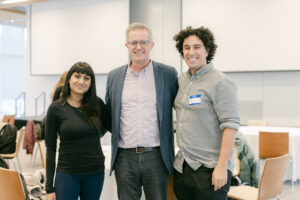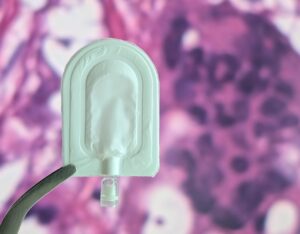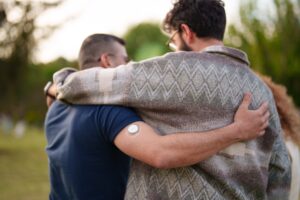
We’ve made major progress in the development of cell replacement therapies for type 1 diabetes (T1D) over the past few decades – much of it right here in Canada. We know that manufactured islets can be safely implanted into people, where they start to make insulin. But there is more work to do to advance these therapies to bring them to more people with T1D.
To drive new work in this area, Breakthrough T1D is pleased to announce a partnership with Canada’s Stem Cell Network (SCN), a non-profit, federally funded organization focused on stem cell and regenerative medicine research. Together, Breakthrough T1D and SCN will support four new projects led by Canadian researchers.
This announcement is an exciting expansion of a strategic partnership that began in 2021. In line with both organizations’ commitment to training future research leaders, we worked together to establish the J. Andrew McKee Fellowship program, awarded annually to a postdoctoral researcher working in regenerative medicine to join the Breakthrough T1D Centre of Excellence at UBC. Past fellows (awarded in 2022, 2023 and 2024) have brought expertise from many fields and countries to the Centre’s research team. Additionally, with both organizations’ interest in accelerating research to commercialization, Breakthrough T1D collaborated with Stem Cell Network to pilot a training program that aimed to increase the regulatory literacy of research trainees, which has subsequently reached many trainees working in regenerative medicine across the country.
To continue the increasing momentum in the field of stem cell-based therapies for T1D, we have now expanded our partnership to fund new translational research focused on innovation and commercialization. We are now excited to be able to announce four jointly funded projects that will receive support from May 2025 – April 2027. These grants are part of SCN’s 2025 national competition on regenerative medicine which is supporting a total of 36 grants.
Dr. Tim Kieffer (UBC), Dr. James Shapiro (University of Alberta), Dr. Takanori Takebe (Cincinnati Children’s Hospital), & Lunar Therapeutics (Vancouver, BC) – Fueling Biotechnology Partnerships Award
Combining stem cell-derived islets and vasculature for a better islet replacement product
Current cell therapies for T1D (i.e., islet transplantation), while often effective, are hampered by reliance upon donated organs and poor cell survival after transplant, necessitating large doses of cells and repeat procedures. This ambitious new project will address both the source of islet cells and the low cell survival rates associated with islet transplantation by accelerating Lunar Therapeutics’ pre-clinical development of a stem cell-derived islet replacement product, what Takebe’s lab describes as ‘complex miniature organs’ for T1D.
This product will consist not only of insulin-producing cells, but also endothelial cells – like those that line blood vessels and the heart. Endothelial cells will support islet cell survival and engraftment upon transplantation.
To accomplish this objective, Lunar Therapeutics will bring together Canadian expertise in stem cell-derived islets and clinical islet transplantation led by Drs. Timothy Kieffer and James Shapiro. The team will also include US-based Dr. Takanori Takebe who specializes in designing complex organoids composed of various cell types. Using technologies developed across each member’s laboratory, this multidisciplinary team will work to deliver an effective islet cell replacement solution.
Dr. Marya Ahmed & Dr. James Shapiro (University of Alberta) – Impact Award
Using naturally derived gels to optimize cryopreservation (extreme cold storage) of stem cell-derived islet
The implantation of stem cell-derived islets in people with T1D can restore insulin production, eliminating the need to inject insulin and improving the life quality of patients. However; after islet cells are harvested (from cadaveric donors) or created (from engineered stem cells) they must be stored before being used to treat a person with T1D. Currently, the storage and transportation of islet cells is difficult and the only storage method is freezing at low temperatures in the presence of reagents (chemical solutions) that help with the freezing process. However, these reagents cause cell death during thawing and can also cause allergic reactions in people when transplanted.
This project will address this gap in the field by aiming to develop non-toxic, naturally derived gels to optimize stem cell and islet freezing and storage. The identified gel-based products will be evaluated for commercial scale production. The success of this project will provide new intellectual property that will be of interest to researchers and companies in regenerative medicine in Canada and across the globe.
Dr. Corinne Hoesli (McGill), Dr. André Bégin-Drolet (Laval), Dr. Richard Leask (McGill), Dr. Andras Nagy (Sinai Health, Toronto), Dr. Steven Paraskevas (McGill) – Impact Award
Vascular lattice bioartificial pancreas for diabetes cellular therapy
(Using blood vessels to create a better encapsulation device for islet replacement therapies)
Stem cell-derived islets offer a potentially unlimited source of islets for transplantation. Since stem cell-derived islets carry unique risks compared with donor-derived islets, containment within a device could allow retrieval if off-target growth ever occurs. However, encapsulation devices that have been tested in clinical trials so far and have shown minimal success, mainly because blood supply to the cells is limited within the devices. In this project, the team proposes to develop a device where the stem cell-derived islets are placed around pre-established vessels that can improve islet cell survival and speed of insulin responses via improved blood supply. In this project, they will optimize their device design and conduct advanced preclinical studies.
This project could lead to better survival and function of stem cell-derived islets. The device could provide long-term blood glucose control without external intervention. The project can also pave the way for other engineered human-scale bioartificial organs.
Dr. Megan Levings, Dr. Bruce Verchere, Dr. Francis Lynn & Dr. Peter Zandstra (UBC) – Impact Award
Using stem cells to create a human T1D immune system model in a petri dish
There are many new treatments on the horizon for T1D, such as replacement of insulin-producing cells, and therapies that seek to block autoimmunity, such as so-called “inverse vaccines” and immune cell therapies. However, a major barrier to all these therapies is the lack of an easy-to-use model in which their effects on human cells can be tested before advancing to human trials. The standard pre-clinical model is to test therapies in small animal models of T1D, but this has significant limitations since it is nearly impossible to replicate the human immune system. In fact, diabetes has been ‘cured’ hundreds of times in a mouse model, which has not translated to humans.
To overcome this barrier, Dr. Levings and her team will establish a new a model that recreates human T1D autoimmunity in the lab. The model will use stem cells to create the three types of cells that are involved in the disease: insulin-producing cells and two different types of immune cells, known as T cells and antigen presenting cells. Using the model, cells can then be combined in different ways to create a method that resembles what usually happens during autoimmunity.
A model of human T1D that can be generated in the lab will help test potential treatments and prompt new questions about why T1D develops, and how to prevent it. Thus, this research has the potential to support the further development of innovative therapies that may offer new approaches to prevent or treat people with T1D.
—
Curing T1D is the north star of Breakthrough T1D, and we are thrilled to continue to build upon and strengthen the relationship with SCN towards our shared goal of a world free from T1D through innovation and forward-thinking research.
Breakthrough T1D Canada will continue to provide updates on these projects as they become available.



